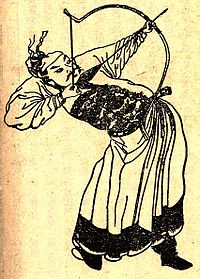
Back تشانج لياو ARZ Zhang Liao Catalan Zhang Liao German Zhang Liao Spanish Zhang Liao French Zhang Liao ID Zhang Liao Icelandic Zhang Liao Italian 張遼 Japanese 장료 Korean
Zhang Liao | |
|---|---|
| 張遼 | |
 Qing dynasty illustration of Zhang Liao | |
| General of the Vanguard (前將軍) | |
| In office 220–222 | |
| Monarch | Cao Pi |
| General Who Attacks the East (征東將軍) | |
| In office 215–220 | |
| Monarch | Emperor Xian of Han |
| Chancellor | Cao Cao |
| General Who Defeats Bandits (盪寇將軍) | |
| In office 205–215 | |
| Monarch | Emperor Xian of Han |
| Chancellor | Cao Cao (from 208) |
| Cavalry Commandant (騎都尉) (under Lü Bu) | |
| In office 192–198 | |
| Monarch | Emperor Xian of Han |
| Personal details | |
| Born | 169[a] Shuocheng District, Shuozhou, Shanxi |
| Died | late 222 (aged 53)[a] Jiangdu District, Yangzhou, Jiangsu |
| Children |
|
| Occupation | Military general |
| Courtesy name | Wenyuan (文遠) |
| Posthumous name | Marquis Gang (剛侯) |
| Peerage | Marquis of Jinyang (晉陽侯) |
Zhang Liao () (169 – late 222),[a][4] courtesy name Wenyuan, was a Chinese military general serving under the warlord Cao Cao in the late Eastern Han dynasty of China. He served briefly in the state of Cao Wei, founded by Cao Cao's successor Cao Pi, in the early Three Kingdoms period before his death. Formerly a subordinate of other warlords such as Ding Yuan, Dong Zhuo and Lü Bu, Zhang Liao joined Cao Cao around 198 after Lü Bu's downfall at the Battle of Xiapi. Since then, he participated in many of Cao Cao's military campaigns, including those against Yuan Shao's heirs and the Wuhuan tribes from 201 to 207. He is best known for his pivotal role in the Battle of Xiaoyao Ford in 214–215, in which he successfully defended Hefei from the forces of the warlord Sun Quan.
Chen Shou, who wrote the third-century historical text Sanguozhi, named Zhang Liao as one of the Five Elite Generals of his time, alongside Yu Jin, Zhang He, Yue Jin and Xu Huang.[5]
- ^ Cite error: The named reference
Zhang Liao was 28was invoked but never defined (see the help page). - ^ Sima (1084), vol. 62.
- ^ Cite error: The named reference
Zhang Liao's deathwas invoked but never defined (see the help page). - ^ de Crespigny (2007), p. 1063.
- ^ (評曰:太祖建茲武功,而時之良將,五子為先。于禁最號毅重,然弗克其終。張郃以巧變為稱,樂進以驍果顯名,而鑒其行事,未副所聞。或注記有遺漏,未如張遼、徐晃之備詳也。) Sanguozhi vol. 17.
Cite error: There are <ref group=lower-alpha> tags or {{efn}} templates on this page, but the references will not show without a {{reflist|group=lower-alpha}} template or {{notelist}} template (see the help page).